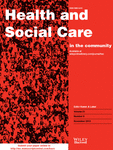‘You say treatment, I say hard work’: treatment burden among people with chronic illness and their carers in Australia
Abstract
The aim of this study was to explore treatment burden among people with a variety of chronic conditions and comorbidities and their unpaid carers. The burden of living with ongoing chronic illness has been well established. However, the burden associated with proactively treating and managing chronic illness, commonly referred to as ‘treatment burden’, is less understood. This study helps to bridge this gap in our understanding by providing an in-depth analysis of qualitative data collected from a large sample of adults from diverse backgrounds and with various chronic conditions. Using semi-structured in-depth interviews, data were collected with a large sample of 97 participants that included a high representation of people from culturally and linguistically diverse backgrounds and indigenous populations across four regions of Australia. Interviews were conducted during May–October 2012, either face to face (n = 49) or over the telephone (n = 48) depending on the participant's preference and location. Data were analysed using an iterative thematic approach and the constant comparison method. The findings revealed four interrelated components of treatment burden: financial burden, time and travel burden, medication burden and healthcare access burden. However, financial burden was the most problematic component with the cost of treatment being significant for most people. Financial burden had a detrimental impact on a person's use of medication and also exacerbated other types of burden such as access to healthcare services and the time and travel associated with treatment. The four components of treatment burden operated in a cyclical manner and although treatment burden was objective in some ways (number of medications, and time to access treatment), it was also a subjective experience. Overall, this study underscores the urgent need for healthcare professionals to identify patients overwhelmed by their treatment and develop ‘individualised’ treatment options to alleviate treatment burden.




